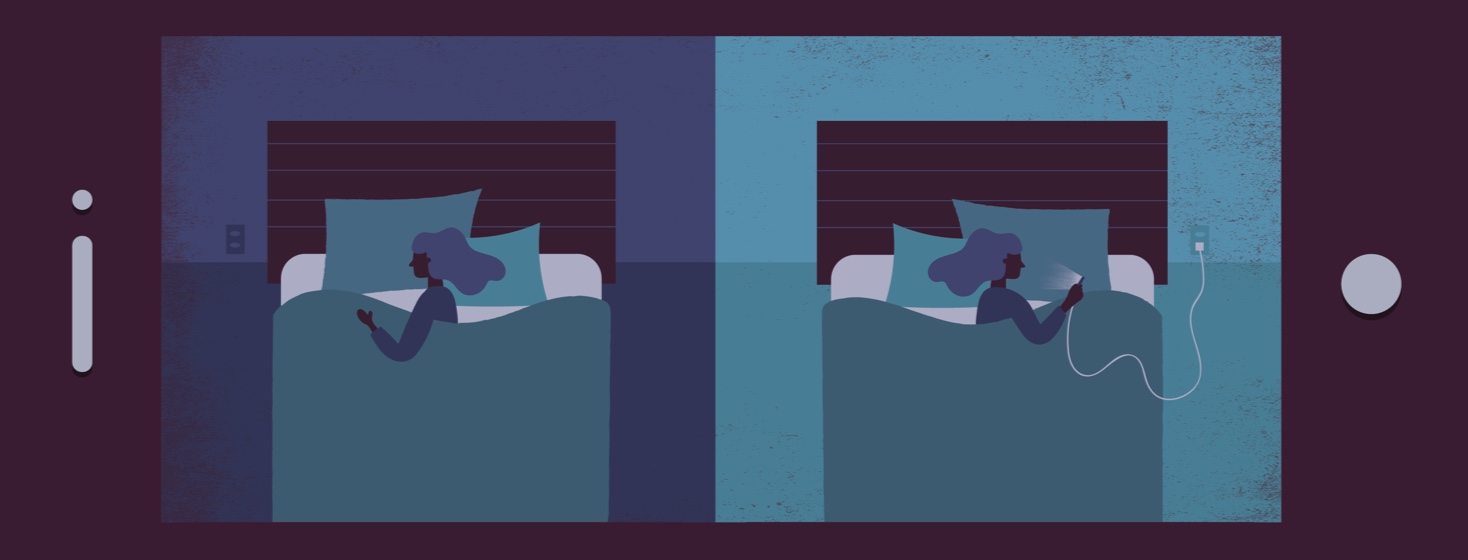Bladder Cancer Sleep Challenge: Don’t Check Your Smartphone at Bedtime
People dealing with cancer may find their smartphones to be both blessing and curse.
You can use it to:
- Search for information
- Keep in touch with your doctor
- Track your activities and sleep
- Distract yourself during chemo (games, social media, movies, reading)
- Reach out to your cancer support network
- Manage your various treatment schedules
However, there’s a dark side that occurs when you take your phone to bed at night.
Bladder cancer and sleep hygiene
Sleep hygiene describes all the different behaviors and habits you practice that can impact your ability to fall asleep and to maintain sleep.1
As you doubtless already know, cancer can lead to many different problems with sleep.2 It can bring insomnia, daytime sleepiness, and nightmares.3
Taking your smartphone to bed with you only worsens an already bad situation.
It’s time to rethink bringing your smartphone to bed with you at night, as well as learn how to break yourself of this bad sleep hygiene practice.
Sleep and the smartphone
We’ve all done it (myself included): plugged the smartphone in to charge on the nightstand. In doing so, we’ve also:
- Visited social media, checked email, or played games
- Fallen asleep only to awaken to incoming notification tones
- Burned sleeping time and struggled to fall asleep, leaving us exhausted during the day due to lost sleep
Check out these reasons why you need to kick this habit tonight.
Light
All handheld electronic devices, including smartphones, emit something known as blue spectrum light. It’s the brightest color in the spectrum.
When blue spectrum light passes through our eyes, it signals to the brain that it’s daylight outside, even at 10 pm.
The brain responds by halting melatonin production. Our bodies produce this hormone naturally to help us fall asleep. Without melatonin, the neurochemical processes that promote sleep literally shut down.4
Content
Ever notice how you rarely use your smartphone as a phone? I’m more likely to turn to mine for the grocery list, email app, social media sites, or podcasts. Yes, even at bedtime.
This stimulation isn’t always a positive. Flame wars in Twitter, a broken app that’s lost all your data, super creepy true crime podcasts, and emails from high-pressure employers or “frenemies” aren’t exactly creating conditions for sweet, dream-filled sleep.
Time
The “time suck” is real. While doing just about anything on your phone, time seems to pause, though it’s still marching forward.
That quick text out to your friend regarding tomorrow’s plans may lead to a digital conversation that lasts an hour or more—a conversation that could’ve waited until morning. Instead, you’ve eaten up at least one of the eight or so hours of sleep you should be getting.5
Outsmart your smartphone at bedtime
The ultimate cancer sleep challenge for most of us may be inextricably tied to bedtime smartphone use.
After all, insomnia, circadian disruptions, nightmares, and daytime fatigue may all circle back to the use of one’s smartphone.
Try these ways to achieve more and better sleep to restore your energy and defeat your cancer.
Don't use it as an alarm
Ask yourself: do you actually need an alarm while undergoing cancer treatment? If not, then awaken naturally in the morning.
If you schedule morning appointments, try an alternative system. A person in the household or a classic alarm clock can work.
Or...go ahead, use it as an alarm
If your bedroom is next to a bathroom, charge your phone and set your alarm, placing it face down to eliminate sudden illuminations. By doing this, you avoid having your smartphone within easy reach, you can still use your pleasant alarm, and it forces you to get out of bed to turn it off.
Use “do not disturb”
Every smartphone offers this option. It shuts off notifications, texts, and calls during pre-set sleeping hours. You can specify which senders can still break through your do-not-disturb settings in an emergency.
Practice relaxation
Some smartphone apps support good sleep hygiene. White noise generators, relaxation music apps, and sleep-inducing podcasts make good sleep-promoting options.
Use a wireless headset you can sleep with comfortably in order to listen remotely from your phone.
Or, ditch the apps entirely! Go “old school”: read, practice yogic breathing, enjoy aromatherapy, take a warm bath at bedtime, or use visualization or muscle relaxation techniques.

Join the conversation